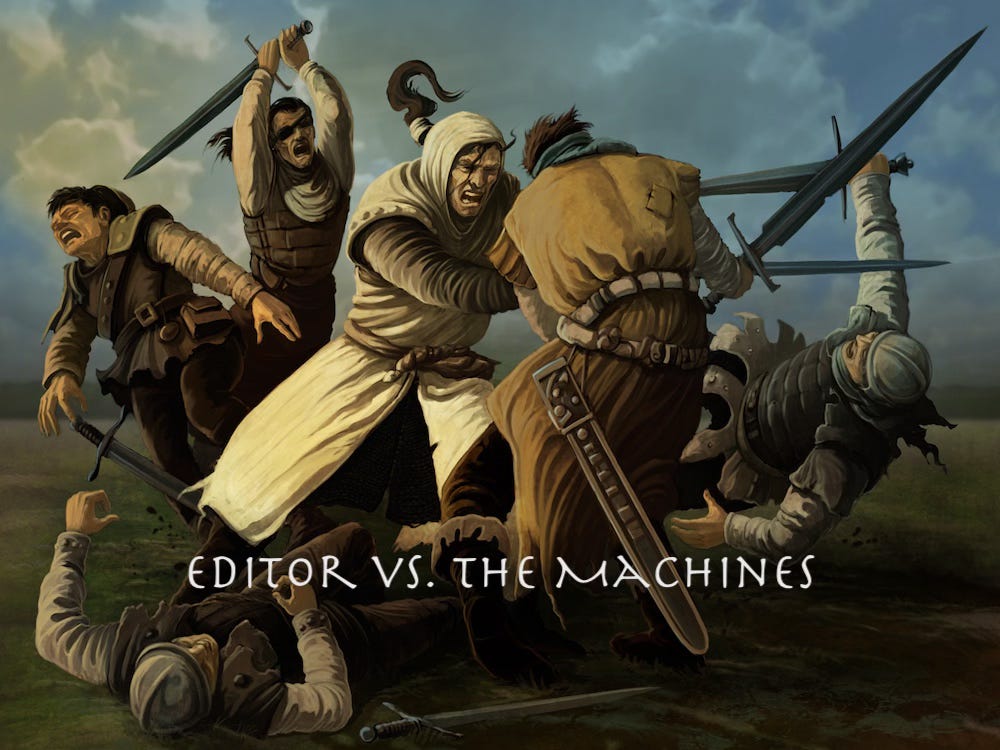What is editorial realism?
Introductory post on the "good enough" school of editing
The Short Story
Editorial realism is a term I’ve coined. (At least, I haven’t found anyone else using it.) The realist school of editing boils down to this overarching principle of our existence: there are limits. Writers and editors face real-world limits to the quality they can produce, based primarily on time and budget.
The Real(ist) Story
I know full well that “limits to quality” is not what authors want to hear. But y’all, I’m saying these things as a professional editor whose detail-orientedness inclines toward perfectionism. I constantly, often involuntarily see how something could be written better. I also have a decade of experience collaborating with other professional editors who likewise make a living from their ability to see the room for improvement in a manuscript.
To survive as an editor and an author, I’ve had to learn to take a step back and know when to say, to myself or others, “This is good enough.” I also find it clarifying (and reassuring) to add qualifiers: “This book or piece of writing is good enough for its intended purpose and audience right now.”
Beyond the extrinsic limits of time and budget, editors—especially self-editors—contend with their human limits. I’m hardly the first person to observe that it’s hard to see your own errors and shortcomings as a writer. Sure, before I post an article on this site or a snippet of my fiction, I reread and fine-tune till I’m out of time or can’t stand to look it at another moment. Y’all will rarely see a true rough draft of anything I’ve written. Then I post it and step away for a spell, which might mean a few minutes or a few months. More often than not, when I lay eyes on it again, I find at least one typo, redundancy, or other cringeworthy imperfection.
I’m well aware that to some folks, this makes me sound like a less than competent editor. A cynical soul might note the convenience of devising an editorial philosophy that rationalizes mistakes. Well, I can’t help any of that. Think what you must.
But consider that major publishing houses spend thousands of dollars on editing and still publish books with the occasional typo or other minor error. A good book isn’t simply error-free; it’s been edited deeply. If it’s error-free, too, that’s almost certainly because there were many editorial eyes on it (and the budget to pay for those eyes).
Likewise, a good editor isn’t an editor who never misses anything. A good editor misses very little, true, but also catches the tricky, nuanced, under-the-surface stuff. Heck, there are plenty of times I’ve caught subtle syntax errors, or commas in less than ideal spots, on a first edit—only to realize on a second edit that I’d glossed over too instead of to.
For the sake of any who object that I ought to have hyphenated less than ideal above, I submit to you a corollary of editorial realism: many standards of writing and editing quality are debatable. They’re matters of context, competing principles, or simple preference. Like the Pirate Code in Pirates of the Caribbean: The Curse of the Black Pearl, the rules of written language are “more what you’d call guidelines than actual rules.” (That said, if you think I ought to have avoided the matter entirely by using suboptimal in place of less than ideal, I agree.)
Despite our limits, and the limits of our standards, you can make your writing incrementally better with each pass—especially if you’re equipped with relevant knowledge and quality feedback. If time and budget allow others with knowledge or experience to give your words a pass, go for it. Beyond that, do your best. Then move on.
That’s editorial realism in a nutshell. It may sound like a cop-out, but it’s how editing and publishing always work on some level. There is no such thing as a perfect human literary creation! Accepting human limits and the mutability of artistic perfection is joyously liberating.
All of this explains why I am not overly concerned if I make a typo in a text message or a grammatical goof in an article. I’m not perfect, and my work isn’t perfect. This article could be better edited. How close I’m willing to get to the ever-elusive perfection in a particular situation is a sober, calculated decision of the moment.
And on some level, I admit, I embrace my fallibility. When another soul trusts his or her work to my editorial eye, I give it my utmost, to be sure. I want my readers to have an enjoyable experience, too. But to the extent that it’s only my pride on the line, I recognize my mistakes as a hallmark of my humanity. Our little errors are part of our human condition, and I’ll take them over AI-induced errors any day. The “toasters”—I mean, AI—will have to auto-correct me over my dead body.
Of course, if I see a typo I’ve made, I’ll mutter something uncomplimentary under my breath, grind to a screeching halt, and go fix it.
Godspeed, folks, and happy rewriting.
(Art ©2016 by Clonefront. Duly licensed by Vaporous Realms Publishing LLC.)



